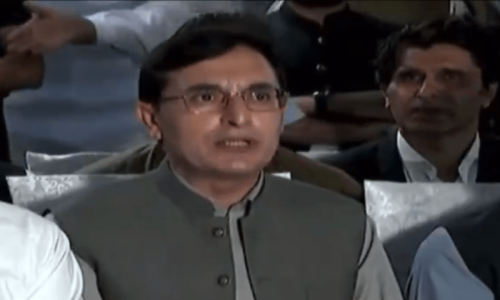HAJIGAK: A group of potato farmers sat cross-legged in a velvet-carpeted madrasa, pensively mulling assembling an armed militia to guard Afghanistan’s largest iron-ore reserve buried in jagged Hindu Kush ridges flanking their village.
Afghanistan’s vast untapped natural resources, valued at more than $1 trillion, are seen as the war-battered country’s ticket to a self-reliant future, a possible trump card that could jumpstart the lagging economy as foreign aid ebbs.
But the lucrative sector — already plagued by rampant corruption, insurgent violence and a lack of regulation which are all deterring international miners — also threatens to fuel conflict and push Afghanistan deeper into turmoil.
“We are sitting on a fortune which could create cars and planes for the world, and jobs and schools for local people,” said Mohammad Reza, 53, twirling his prayer beads.
“But this treasure could fall in the wrong hands if militants start infiltrating into Hajigak,” added the father-of-six, sitting among robed and turbaned farmers in the library of the seminary.
Hajigak, a patchwork of boulder-strewn ridges and wildflower meadows in central Bamiyan province, sits atop an estimated 1.8 billion tonnes of iron-ore — one of the world’s biggest such untapped deposits.
Barring occasional incursions by armed nomadic tribesman, this remote region dominated by minority ethnic Hazaras enjoys relative tranquillity despite being hemmed in by insurgency-wracked provinces.
‘Resource curse’
“Afghanistan is on a resource curse trajectory,” Javed Noorani, an independent Kabul-based researcher on mining, told AFP. “There is a real danger that the political conflict could morph into a resource conflict.”
Noorani cites a proliferation of criminal syndicates facilitating the cross-border movement of illegally mined gemstones and other resources, including the country’s biggest cash crop opium — often in cahoots with insurgents who charge “protection money”.
“This shadow economy is expanding the war chests of militant groups and fuelling the conflict,” he said.
Mining offers the largest potential for employment and revenue generation in a country heavily reliant on foreign aid, fast dwindling as international troops depart. President Ashraf Ghani recently quipped that Afghanistan’s mining resources were enough to feed the country for 400 years.
But the biggest mining projects worth billions of dollars are mired in delays due to security risks and a lack of technical capacity.
‘Distant goal’
The Afghan government “lacks the technical capacity to research, award and manage new (mining) contracts without external support”, the Special Inspector General for Afghanistan Reconstruction (SIGAR) said in a scathing report in April.
The US watchdog added that a nearly $500 million grant from Washington to develop a self-sustaining Afghan mining industry had failed.
Meanwhile, in Hajigak the inordinate delay in getting the mining project off the ground has left villagers seething with frustration. Potato harvests, the local mainstay, depend on the brutal vagaries of the weather.
At the madrassa, replete with pictures of spiritual saints gazing down from the walls, Nowroz Ali Saifyar described the scourge of joblessness as a ticking time bomb.
“Look around you — even young university graduates are jobless,” said Saifyar, an elderly former mujahideen leading the effort to mobilise the militia.
“We want to tell mining companies: we will protect you with our lives if you start this project. Help us put bread on our table all year round.”—AFP
Published in Dawn, September 5th, 2015
On a mobile phone? Get the Dawn Mobile App: Apple Store | Google Play












































Dear visitor, the comments section is undergoing an overhaul and will return soon.